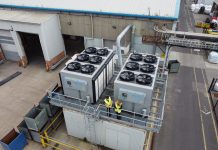 There have been some high profile power outages at data centres, political instability in the EU and suggestions that data centres could become the next target for terrorist organisations. A data centre hidden in the Swiss Alps aims to mitigate these risks, combining high security, resilience and energy efficiency. Louise Frampton reports.
There have been some high profile power outages at data centres, political instability in the EU and suggestions that data centres could become the next target for terrorist organisations. A data centre hidden in the Swiss Alps aims to mitigate these risks, combining high security, resilience and energy efficiency. Louise Frampton reports.
Hidden in a former Swiss military bunker deep within the Alps, the Deltalis data centre provides colocation services to clients with some of the most demanding requirements, and operates in the context of the world’s most robust privacy laws. Built 300m deep into the mountain side, the bunker was originally designed to withstand threats from Cold War enemies, meeting the highest security standards.
“When we established Deltalis, we had three primary goals,” notes Frank Harzheim, the company’s CEO. “We wanted to deliver absolute physical and digital security so that our clients could trust us without question. Switzerland has recently been ranked number three of the most suitable countries in the world to locate a data centre from a risk point of view. We also wanted to provide a facility that would be trusted within the Swiss market – one of the most demanding anywhere globally. Finally, our aim was to offer customised services, delivering a more bespoke experience than can be found elsewhere in the market.”
As a business committed to sustainability, Deltalis was keen to reuse an existing facility rather than a new build. As well as creating one of the most secure data centres, this location freed the facility from the risks associated with an urban environment such as vibrations, overloaded energy networks, civil works and construction.
Being located only 60 minutes from Zurich, it is also connected to one of Europe’s thriving commercial hubs, ideal for both domestic and international accessibility.
The company serves a very broad range of international customers – many of whom are small and mid-size businesses with a core reliance on secure data housing and management. Alongside typical use cases, some clients use the facility as a backup site for disaster recovery while others are cloud service providers themselves, delivering absolute security to their own customer base.
Common to all their needs is the ability to trust in the data centre they use. Among the various factors that allow Deltalis to deliver this trust is the ISO 27001 certification.
Data centre infrastructure management
Trellis, a data centre infrastructure management (DCIM) platform from Vertiv, has provided Deltalis with the enhanced visibility, control and planning needed to help achieve ISO 27001, as well as helping the data centre to increase energy efficiency, ensure uptime and improve thermal performance.
“Any data centre decision maker who has been through ISO 27001 certification knows how demanding the standard is,” Harzheim comments. “There is no room for ambiguity or error and it demands a systematic approach to managing sensitive company information. We had to undertake a series of risk management processes to ensure that data remains secure, and this spans people, processes and IT systems. Despite the challenges, there are significant benefits to our customers, such as improved business continuity and risk management, legal compliance and the elimination of key security threats.
“In our case, creating an optimised mission critical facility didn’t mean just starting from scratch with a green field site. We needed to turn a non-custom designed site into a highly optimised and efficient data centre.
“This required smart engineering to get around physical and legacy infrastructure factors. Furthermore, we knew that we needed complete visibility and control of the performance of our data centre, and everything that is important in our service – which is why we have DCIM at the core of our operations,” Harzheim states.
The customers’ Service Level Agreements (SLAs) guarantee 99.999% uptime and Harzheim reveals that the data centre has exceeded this, with no outages in the past year. In such an event, the data centre’s redundant systems would take over and this requires a powerful monitoring system. The Trellis platform has enabled Deltalis to undertake live health checks of the data centre – examining the facility’s power consumption, the performance of critical systems and gaining information about key assets such as alarms.
“The hardware and software combination of Trellis and its ability to consolidate alarms from heterogeneous systems was significant for us. Because we kept some of the existing infrastructure, it was important that the data centre infrastructure management systems allowed us to visualise all the critical systems and this required a system that could manage diverse systems, both old and new, with different interfaces. Trellis is exceptional at integrating different language and protocol systems in a single control panel,” Harzheim explains.
The company also needs to be able to make informed decisions, particularly in relation to capacity management: “As a data centre provider we have a conceptual perfect state of 100% utilisation of capacity. But getting anywhere close to this is challenging, and the more we use our space, the more we have to understand the impact on cooling and other operational factors,” comments Harzheim. “Now, with Trellis, we have the ability to make those decisions. Equally, a major cost for our business is power, and Trellis helps us to optimise this key operational factor. With this combined visibility we can get the most from the considerable investments we have made, and maximise the value of those assets.”
High levels of energy security and sustainability are important advantages of the site – the data centre uses locally produced, 100% green energy from hydroelectric power stations in the surrounding mountains and any KW that is consumed by the customer is 100% CO2 neutral, says Harzheim.
Cooling and energy management
He further points out that these green credentials are achieved without charging customers a premium and certification can be provided for businesses that use their services; in fact, more and more businesses are demanding this as part of their corporate commitment to sustainability, he reveals.
Cooling contributes to a significant part of a data centre’s energy consumption and one of the key challenges in locating the data centre in the bunker was to optimise thermal management:
“The system put in place by the Swiss military was very good but the air quality required for a data centre is different – it needed to be as dry as possible. Cooling dry air is much more energy efficient and this was one of the main challenges, so we optimised control of the air conditioning system and adapted it to the data centre requirements,” Harzheim comments.
He explains that one of the advantages of the location is the ability to access mountain water reservoirs, providing a natural resource for cooling.
“From the outset, we wanted to be more energy efficient than others and we use free cooling as much as possible. It was our target to have a PUE of 1.3 or even better. However, we look at energy consumption in its entirety.
A good DCIM system provides transparency and visibility of all the important elements required in determining PUE and managing data centre energy consumption. Trellis has a strong reporting tool which is an important feature – we offer colocation facilities, where a client may be located alongside a larger customer, as well as private, dedicated suites.
“Colocation customers may also want data on their own individual PUE, therefore,” explains Harzheim, pointing out that Trellis has the ability to provide this information.
Reporting and visibility
Harzheim adds that visibility for customers is an important commercial differentiator for the data centre: “It will soon be possible for customers to remotely log on and see everything that we see using Trellis, anywhere, any time. Our ‘Deltalis Virtual View’ service provides access to reporting and DCIM functionality in a transparent way, allowing them to better understand their own infrastructure,” Harzheim comments.
“When coupled with our ‘Deltalis Virtual Reach’ service, using Vertiv secure remote management, they get the real-time accessibility and visibility they are looking for.
“This is especially important for our international customers who may not have a regular on-site presence. This helps with their remote IT management and their strategic decision making,” comments Harzheim.
The technology allows customers to view and manage their inventory, as well as alarms, and there are also plans to offer a feature to enable clients to understand their energy consumption.
“Even in the pre-sales stage, we can act as a consultant to help potential customers better determine what space they need, visualise the floor plans in 3D and give them a complete picture of their considered investment, so we’re adding real value, not just the floor space alone,” adds Harzheim.
Staying one step ahead is very important to Deltalis and the organisation is currently working with 3M and Dehmel Technology on implementing innovative cooling technologies. The latest innovation being launched is based on immersion cooling, eliminating the need for conventional cooling technologies that depend on electricity. The hardware is contained in a liquid developed by 3M (Novec Engineered Fluid), which evaporates and condenses. By implementing this method, the data centre can use 100% free cooling, without compressors. It can reduce operational costs (Opex), offering >90% less energy consumption for cooling and >60% less maintenance costs, while improving operational security.
The solution is also claimed to be better for the environment, delivering: >30% total energy savings for the data centre, a significant reduction in CO2 footprint, with no requirement for F-gas refrigerants for active cooling. The rack and cooling system are built into a single unit and, as the solution requires up to 75% less floor space, it also improves capacity for high-density computing.
Ultimately, the Deltalis mantra states that it is “all about trust”. There have been some high profile outages at data centres, political instability in the EU and suggestions that data centres could become the next target for terrorist organisations.
Deltalis has implemented the latest technology to mitigate risk by delivering real-time visibility into critical infrastructures.
Independent from the world energy markets, protected in one of the most secure facilities, and located in one of the most politically stable countries in the world, the data centre is positioned to offer “hyper security in a changing world”.



